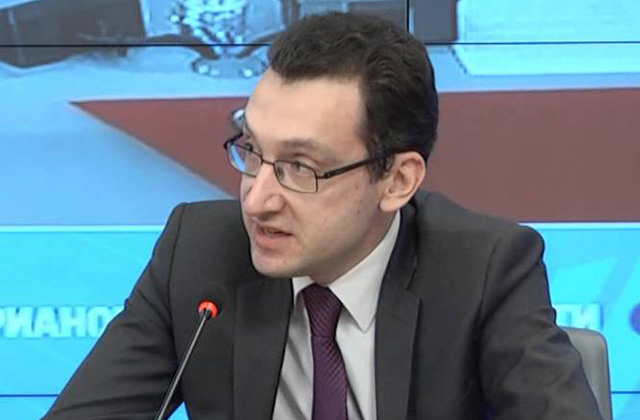“The West Attempts to Deeply Engage with Karabakh Conflict Management”

Aliyev-Sargsyan meeting launched in Vienna on May 16, agreements reached during it, representativeness of the event have raised a range of questions among the expert community. “168 Hours” talked to Alexander Gushchin, analyst, associate professor at Russian State University for the Humanities, on the meeting in Vienna and the developments following it.
Mr. Gushchin, after the April four-day war for the first time due to the efforts of OSCE MG the meeting of the presidents of Armenia and Azerbaijan was held in Vienna, statement of which prompts that the sides agreed on installation of investigative mechanisms. How do you assess the results of the meeting? In your opinion, how stabile are they under current geo-political developments and the trust deficit between Armenia and Azerbaijan?
Obviously Karabakh issue today is no more a bilateral conflict; Turkish factor, Russia-West confrontation are already existent here, however, despite disagreements around the South Caucasus, not a single mediator, providing security currently may have dominant positions in the South Caucasus, including the West. Thus, Russia, like the West, also isn’t able to control the situation. In this sense, there is a consensus between Moscow, Washington and Paris. Of course, interests of these world leading powers clash here, however, they clash and reach to a certain point. I think, at this stage neither side wants sharp tension of the conflict in the region. The Vienna meeting didn’t lead to legal or breakthrough results; it was even hard to anticipate such results after the April war. Moreover, the fact, that negotiations are ongoing, is already a positive course. I don’t consider that any peacemaking mechanism will be quickly installed, agreement around it will be rather difficult. Thus, interim results mentioned by you are successive in comparative terms. Accordingly, although dispositions of the parties are different, and possibility of further threat is as high as before, I consider, refraction shouldn’t be anticipated on account of Azerbaijan’s sharp disposition, as well as the fact that maintenance of the status quo is beneficial for Armenia, and inside Azerbaijan there are such moods, that they recorded success, thus confrontation will continue, however, serious clashes after Vienna meeting seemingly aren’t anticipated.
I think, continuation of negotiations is important if the mediators succeed to keep the negotiating parties at the table, this may be regarded a refraction, as we’ll return to the stage, when even certain freezing of the conflict will be a positive step. Moreover, Azerbaijan faces a difficult situation, although it strengthened its army, factor of Turkey is existent as well, and this military-political activation by Azerbaijan may cause Iran’s discontent, Russia’s restricting disposition, thus, the situation is complicated here, and the sides, including Azerbaijan, which is freer than Armenia on account of economic condition, is restricted in its disposition.
Novruz Mammadov, assistant to the president of Azerbaijan, denied today that Azerbaijan has assumed liabilities in Vienna and agreed with the Armenian side on the abovementioned issues. Doesn’t this mean that agreements are uncertain, and new military operations are still ahead?
This first and foremost speaks of the fact that after military operations with restricted success for internal use of Azerbaijan, they consider, they’d hardly state on certain withdrawal, as from the perspective of public consensus that would be politically wrong. Secondly, these agreements have been reached not in Vienna, but negotiations ended in a way, that the statement didn’t contradict the exit of those negotiations. Baku disposes itself in a way to be comprehensible that hands of Azerbaijan are free in a sense that in case of tension they’ll entitle themselves for attack or restricting activities. However, I don’t consider that a sharp reflection will follow that meeting, like in case of the April war. However, let me mention once again that this refers short-term future, as the dynamics of the developments is such, that it is hard to anticipate that the situation will be maintained. Here the situation may change at any moment, if we speak of optimism, then it’s a perspective for a few months, and then we’ll see, what the results of the forthcoming meeting will be like.
After the April war, as Russian media outlets were reporting, the Russian party was planning a presidential meeting which failed, however, the meeting was launched in Vienna. Russia seemingly has always strived to maintain its leading position in the conflict, failed its initiative and Western co-chairs started functioning, which has moved the settlement to the Minsk format. What’s your assessment to Russia’s disposition in Karabakh conflict and in relations with Armenia and Azerbaijan?
Assessments may be found in some media outlets, that Russia is losing the South Caucasus and etc. I consider, what happens now tactically can’t be qualified as success for Russian diplomacy, however, I wouldn’t consider this a complete failure, as the response of the Armenian society on armaments selling was rather sharp, and there are some issues in this regard. However, I consider if there is no great tension not only between Armenia and Azerbaijan, but even wider—involvement of Turkey, Russia and the West, Russia won’t support any side, this shouldn’t be expected. Close relations won’t be recorded between Baku and Moscow, however, Baku is more crucial for Moscow regarding issues of energy, Iran, as well as Caspian basin, thus 100% decline is not possible here. Clearly enough, it’s hardly perceptible for Armenia, besides, Armenia’s expectations from EEU and CSTO aren’t justified, volumes of mutual trade within EEU record a decline, however, despite eliminations of restrictions, we need to understand that Russia will maintain current temp. The West has been involved in the settlement process, and, consider Moscow doesn’t have the supremacy of conflict settlement, and the fact of Vienna meeting shows that the West from tactical perspective attempts to make use of the situation and deeply engage with the conflict management process. Thus, in my opinion, Moscow’s role will be high in any case, on account of its military presence in Armenia, Armenia’s membership to EEU, and from the settlement perspective the role of OSCE MG and the West has currently increased.
However, do you observe cooperation between the West and Russia? Were these agreed steps or no?
It early to speak of theoretical understanding. I think, in the South Caucasus, like in Central Asia, like in the western part of the post-Soviet space, USA-Russia relations are competitive, it refers not only to the conflict, but their influence in Armenia and Azerbaijan. This competition will go on. However, from military tension perspective, Moscow, Washington and Paris at this stage attempt to find ways to suspend that tension and it’s a crucial exit. Obviously, neither side is interested in the armed war. However, the algorithm of political settlement is not known and clear. The sides are too far in their dispositions, thus we again return to freezing.
Mr. Gushchin, Vladimir Putin, RF president, held a Security Council to discuss NK conflict settlement process after Vienna meeting. What does this mean?
Ukrainian crisis and Syrian issue are key points for Russia, the latter is really a powerful state, foreign policy of which is seriously diversified despite all the existent issues in these two regions, serious issues are available, which need to be settled. Issues of the states de facto are one of the greatest issues of foreign policy by Russia, thus the tension recorded in April is linked not only to Karabakh, but the order of making decisions existent within cooperation of EEU actors, with CSTO, thus this tension hits a blow not only to relations with the South Caucasus countries, but also is important from integration perspective, it impacts on many other processes, thus settlement or suspension of military operations is a priority for Russia, that’s why it’s being discussed on a high level.
By Araks Martirosyan

























